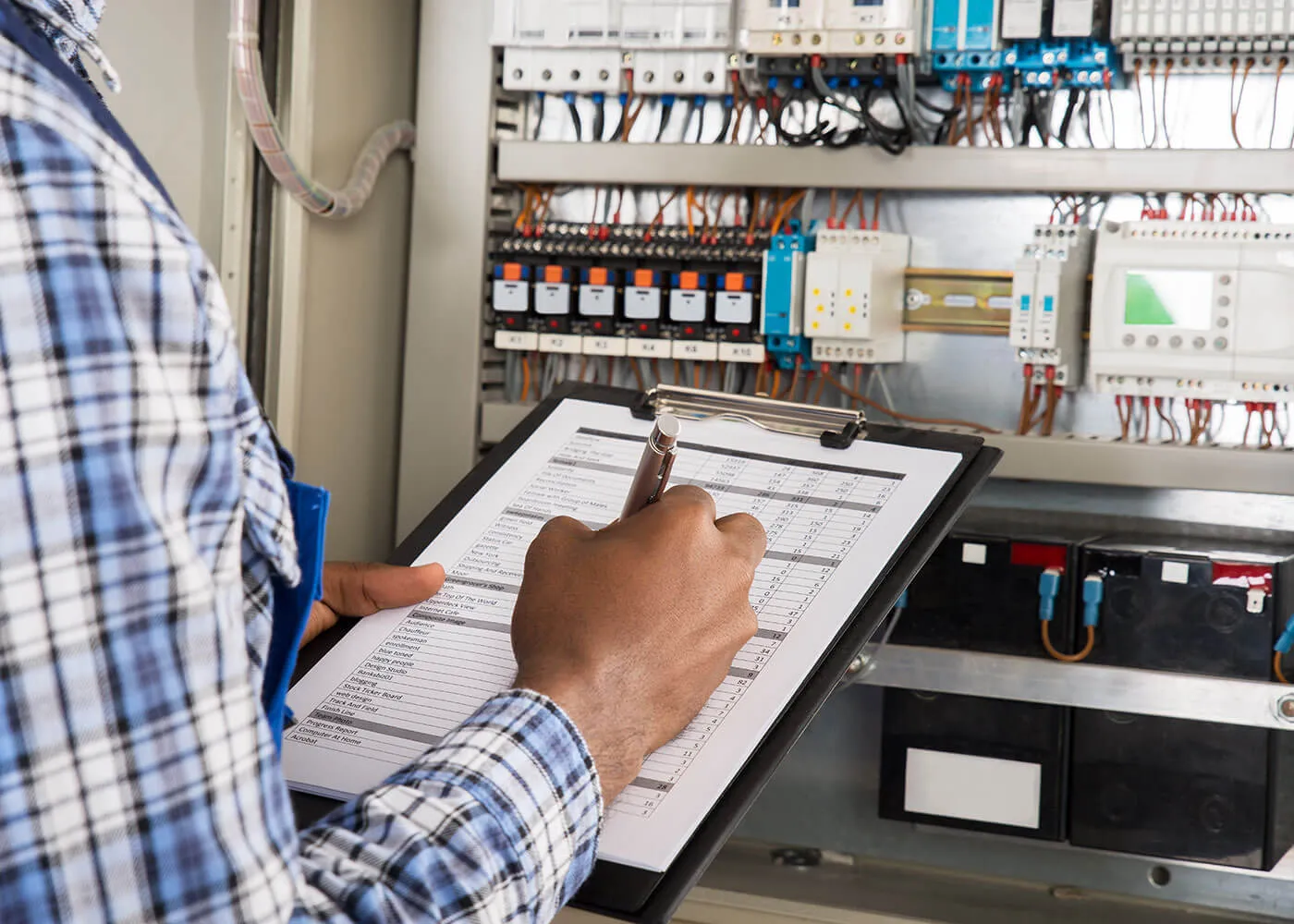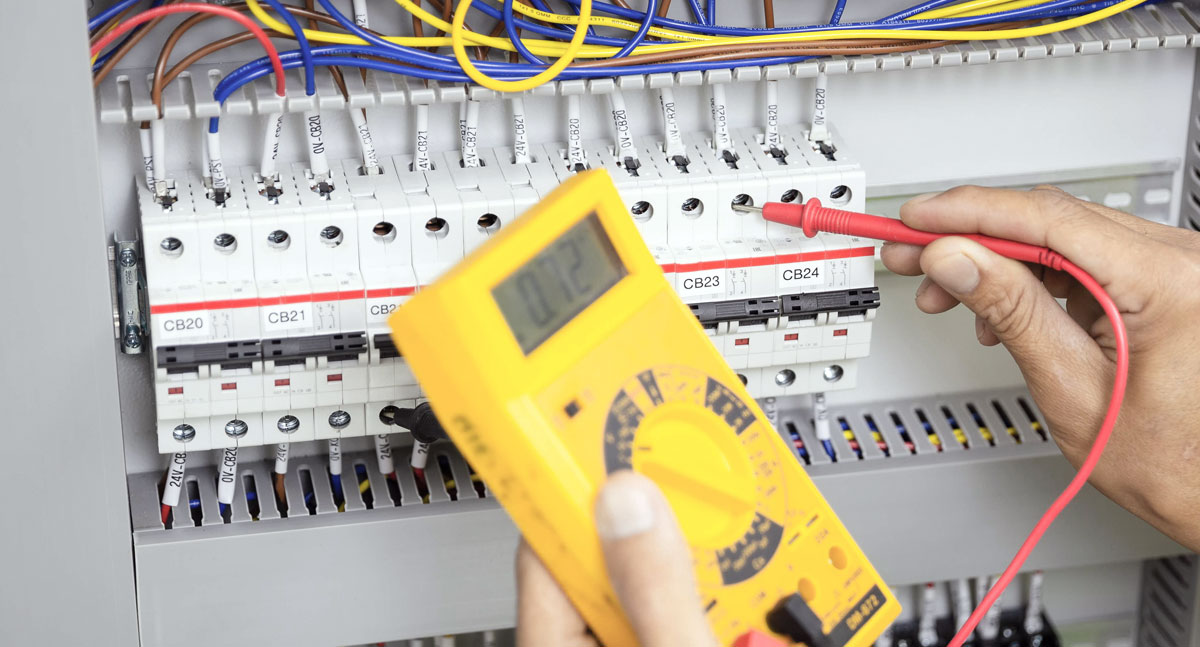July 19, 2025
Are you taking the necessary steps to ensure the safety and efficiency of your electrical systems? In this day and age, where electricity powers almost every aspect of our lives, it's crucial to prioritize the regular inspection of your electrical systems. By understanding the importance of electrical inspections, knowing when to schedule them, and choosing the right professionals to conduct them, you can prevent potential hazards, ensure compliance with regulations, and protect your property and everyone in it. In this blog, we'll delve into the significance of electrical inspections, the signs that indicate the need for one, and the benefits of hiring a licensed professional to conduct the inspection. We'll also explore the common issues that are identified during inspections and the impact of regular inspections on businesses. So, let's dive into the world of electrical inspections and discover why they should be your first step in maintaining a safe and functional property.

Credits: helloelectrical.com.au
Regular electrical inspections are crucial for ensuring the safety and functionality of your electrical systems. By conducting routine inspections, potential hazards can be identified and rectified before they escalate into more significant issues. This proactive approach not only prevents accidents but also saves you from costly repairs in the long run.
Skipping electrical inspections can lead to various dangers such as electrical fires, shocks, and equipment malfunctions. Ignoring the need for inspections puts both your property and its occupants at risk. With professional electrical inspection services, you can have peace of mind knowing that your electrical systems are up to code and free from any hidden threats.
In addition to safety concerns, regular inspections also ensure compliance with industry regulations and standards. Whether it's a residential or commercial property, adhering to these guidelines is essential for avoiding legal liabilities. By making an electrical inspection your first step, you prioritize the well-being of everyone in the building while staying ahead of any potential compliance issues.
Don't wait for a major electrical issue to arise before scheduling an inspection! If you notice flickering lights, frequent tripped circuits, or burning odors coming from outlets, it's time to call in the professionals. These warning signs could indicate underlying issues with your electrical system that need immediate attention. By scheduling regular inspections at the first sign of trouble, you can prevent potential hazards and ensure the safety of your home or business.
For residential properties, it's recommended to schedule an electrical inspection every 5-10 years, depending on the age and condition of your home. Older homes may require more frequent inspections due to outdated wiring and components. On the other hand, newer constructions may only need inspections every decade. It's important to consult with a qualified electrician to determine the best schedule for your specific property.
In commercial properties, where electrical systems are often under heavier use and stress than in residential settings, inspections should be scheduled more frequently. Commercial properties should typically have their electrical systems inspected every 3-5 years to ensure they meet regulatory requirements and maintain safe working conditions for employees and customers alike.

Credits: jadelearning.com
When it comes to selecting a professional for your electrical inspection, qualifications are crucial. Look for an inspector who is licensed and certified in electrical systems. This ensures that they have the knowledge and expertise to thoroughly assess your electrical setup and identify any potential issues.
As you search for the right inspector, don't hesitate to ask questions about their experience and training. Inquire about their previous projects and whether they have dealt with similar electrical setups before. A skilled professional will be transparent about their background and provide references or testimonials from satisfied clients.
Hiring a licensed professional is essential for ensuring the safety of your home or business. With the complexity of modern electrical systems, it's imperative to choose an experienced individual who can accurately evaluate any potential hazards. By taking the time to find a qualified inspector, you can rest assured that your electrical inspection will be conducted with thoroughness and precision.
When it comes to understanding the process of an electrical inspection, it's important to know that a thorough inspection involves several crucial steps. This includes examining the electrical panel, checking for proper wiring and grounding, as well as inspecting outlets and switches. Additionally, a professional may also assess the condition of appliances and look for any potential fire hazards. Each step is essential in ensuring that your electrical system is safe and up to code.
During an inspection, common issues such as outdated wiring, overloaded circuits, or faulty connections are often identified. These issues can pose serious safety risks if left unaddressed. By uncovering these problems early on through an inspection, you can prevent potential hazards such as electrical fires or shocks. The goal is not only to identify existing issues but also to provide recommendations for upgrades or repairs to improve overall electrical safety.
The duration of an electrical inspection typically depends on the size and complexity of the property being inspected. While some inspections may take just a few hours for smaller homes or offices, larger buildings with more intricate electrical systems might require a full day or longer for a comprehensive evaluation. Regardless of the time frame, investing in a professional electrical inspection is crucial for maintaining the safety and functionality of your property.
When it comes to the cost of electrical inspections, many factors come into play. The size and age of the property, the complexity of the electrical system, and any additional services required can all influence the final price. However, investing in a professional electrical inspection is a small price to pay when compared to potential repair costs down the line.
In South West Sydney, the average price range for an electrical inspection varies depending on the scope of work. Generally, you can expect to pay between $150 and $500 for a comprehensive inspection. While this may seem like an added expense, it's important to remember that regular inspections can help prevent major issues from arising in your electrical system.
It's easy to see why some homeowners may be hesitant about shelling out money for an inspection upfront. But when you consider that identifying and addressing minor issues early on can save you from costly repairs or even potential hazards later on, it becomes clear that a professional electrical inspection is well worth the investment.

Credits: finnleyelectrical.com
Regular electrical inspections can significantly impact the productivity and efficiency of your business. By identifying potential issues early on, you can avoid unexpected downtime and costly repairs. This proactive approach allows you to address any electrical concerns before they escalate into major problems, ultimately keeping your operations running smoothly.
In addition to maintaining productivity, regular electrical inspections also ensure that your business is in compliance with workplace safety regulations. Meeting these standards not only protects your employees from potential hazards but also demonstrates a commitment to providing a safe working environment. By prioritizing the safety of your electrical systems, you can mitigate risks and create a secure space for both workers and customers.
Furthermore, conducting routine electrical inspections minimizes the risk of unexpected failures or breakdowns. This proactive maintenance helps prevent disruptions to your daily operations and avoids costly downtime. By staying ahead of any potential issues through regular inspections, you can maintain a reliable electrical system that supports the ongoing success of your business.
When it comes to the safety of your home or workplace, routine electrical inspections are an absolute must. These inspections play a crucial role in preventing potentially catastrophic electrical fires and accidents. By identifying and addressing any potential hazards early on, you can rest assured that you are taking proactive steps to keep everyone in the space safe from harm.
In addition to preventing disasters, regular electrical inspections also contribute to protecting the overall well-being of residents and employees. Faulty wiring or outdated electrical systems can pose serious risks to health and safety if left unchecked. With professional electrical inspections, you can ensure that every aspect of your electrical system is up to standard, providing peace of mind for all who inhabit or frequent the space.
Furthermore, staying up-to-date with routine electrical inspections ensures compliance with insurance requirements. Many insurance providers require proof of regular maintenance and inspection of electrical systems in order for coverage to remain valid. By scheduling professional electricians to conduct thorough examinations of your electrical setup, you not only prioritize safety but also maintain full insurance compliance.
When it comes to electrical inspections, the allure of saving money by conducting a DIY inspection can be strong. However, it's important to consider the potential risks associated with this approach. Without the expertise and knowledge of a professional, you could miss critical issues that could lead to safety hazards down the line.
On the other hand, opting for a professional electrical inspection brings numerous benefits. With their specialized training and equipment, professionals can identify problems that may not be apparent to an untrained eye. This can save you from potential disasters and costly repairs in the future. Additionally, relying on a professional ensures that your inspection meets all legal requirements and standards.
Ultimately, while DIY inspections may seem like a cost-effective solution at first glance, investing in a professional electrical inspection is crucial for ensuring the safety and functionality of your electrical systems. The peace of mind that comes with knowing your home or business has been thoroughly inspected by experts is well worth the investment.
One of the most common issues found during electrical inspections is outdated wiring and electrical panels. These older systems may not be equipped to handle the demands of modern technology, leading to potential safety hazards. By identifying and addressing these outdated components, homeowners can ensure their electrical system meets current standards for safety and efficiency.
Another issue frequently uncovered during electrical inspections is overloaded circuits. Over time, as more devices and appliances are added to a home, the demand on the electrical system can become too much for existing circuits to handle. This can lead to overheating, sparks, or even fires if left unchecked. An inspection can pinpoint any overloaded circuits and provide recommendations for redistributing the load or adding additional circuits as needed.
Faulty switches, outlets, and light fixtures are also commonly discovered during electrical inspections. Loose connections or damaged components pose a serious risk of fire or electrocution if not promptly addressed. A professional inspection can identify these potential hazards before they become dangerous problems, giving homeowners peace of mind that their electrical system is safe and reliable.
At EA Electrics, we understand the importance of reliable and professional electrical services for local residents and businesses in South West Sydney. Our team of trusted electricians is dedicated to providing top-notch electrical solutions, whether it's for residential or commercial needs. From electrical installations and repairs to maintenance and troubleshooting, we've got you covered. With our years of experience and commitment to quality workmanship, you can trust us to handle all your electrical needs with utmost professionalism and efficiency. Choose EA Electrics for peace of mind and superior service for all your electrical requirements.
An electrical inspection is a thorough examination of the electrical systems and components in a building to ensure they are safe and up to code.
An electrical inspection is important because it helps identify potential hazards, ensures compliance with safety regulations, and can prevent electrical fires and accidents.
It is recommended to get an electrical inspection when buying or selling a property, before starting a major renovation or addition, or if you suspect any electrical issues or safety concerns.
An electrical inspection should be performed by a qualified and licensed electrician who has expertise in inspecting electrical systems and is familiar with local electrical codes and regulations.
An electrical inspection involves a comprehensive evaluation of the electrical panel, wiring, outlets, switches, lighting fixtures, grounding, and other electrical components to check for safety, functionality, and compliance.
TL;DR: Electrical inspections are crucial for ensuring safety and compliance in both residential and commercial properties. Hiring a licensed professional is important, as they can identify potential hazards and common issues such as outdated wiring and overloaded circuits. Regular inspections can prevent electrical fires, accidents, and downtime, ultimately saving money on potential repair costs. Avoiding inspections can lead to serious risks and legal implications, making it essential to prioritize an electrical inspection as the first step in maintaining a safe and efficient electrical system.